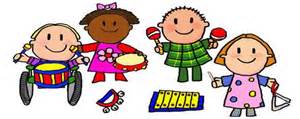While children most likely celebrate at school with their peers, it’s also fun to celebrate…
Music plays a huge role in our everyday lives, from listening to the radio (or Spotify) in the car to singing songs around the holidays or as part of worship at church. We use songs to calm and soothe, energize, and engage with those around us, and small children gain even more from music and song.
To help you understand why music is so important to child development, our preschool in Raleigh is sharing five incredible ways music benefits preschoolers and toddlers

Music Boosts Brain Power in Children
Countless studies have shown that musical activities ranging from listening to music to playing an instrument or singing stimulate the brain. In small children, this can improve the brain structure, leading to the formation of neural connections which can stimulate parts of the brain related to developing reading skills, math skills, and emotional development.
Research has also shown that the brain of a musician works differently than that of someone who doesn’t play music. Musicians use more of their brains when playing an instrument, and this results in the growth of neural activity.
Musical training also helps to develop the part of the brain responsible for processing language, which can lead to improvements in verbal and written skills. For these reasons, children who are exposed to music at a young age often show improved academic development.
Memory Improves Through Music
From state capitals to multiplication tables, many of us will recall information quickly thanks to a song we learned in elementary school – that’s because music increases our ability to retain information! Because music stimulates different patterns of brain development, it can also improve memory and the ability for children to recall details because it builds a stronger connection in the brain.
And the earlier you introduce music as a tool for memory, the better. Before the age of seven, the brain is still building its neural pathways, so introducing music before that age gives your child a leg up when it comes to more than just memory. Even if you start integrating music after this age though, the results are still impressive, with students from preschool all the way through high school who play music showing a stronger memory than those who do not.
Music Increases Confidence in Preschoolers
Musical education has been known to increase confidence among children, but even listening to music can give confidence a boost. With children, learning how to play an instrument, perform with a group or on their own, and gain encouragement in doing so can lead to improved confidence and comfort in public or social settings even as children get older.
This increased confidence is also strongly connected to their ability to socialize and their sense of self when in groups. For instance, a child may be able to form and solidify bonds with others by connecting through music or playing instruments together, leading to increased confidence. Similarly, the increased confidence can be carried into other relationships, and give them a better foundation for connection and communication.
Music Fosters Creativity in Toddlers and Preschoolers
Singing, dancing, and playing an instrument all spark a child’s creativity. Often, children will make up songs, create their own dances to go with music, or even make up original tunes on a piano, xylophone, or other instruments. All of these activities aren’t just fun, they promote divergent thinking, which is imagination and expanding thoughts to generate new ideas, as well as convergent thinking to narrow down choices to the best option.
Additionally, a study in 2017 found that music with a strong emotional impact and an upbeat tempo can increase creativity and ideas. This “happy music” has been associated with more flexibility, an ability to come up with more innovative ideas, and a generally positive attitude, which itself may be enough to spark creativity.
Music Education Improves Social Skills
Music, particularly learning music in a group setting, helps children increase and improve their social skills. Whether singing a song, learning to play different instruments, or dancing to music, children learn how to respond to people around them, work together, and create connections. Plus, because it builds confidence and creativity, this all works hand-in-hand with improving social skills.
Learning to work together through music education, and actively listening to different kinds of music and songs, can also promote empathy. Studies have shown that when children play music or sing together, whether one-on-one or in large groups, they learn more quickly how to understand and tune in to how their peers are feeling.
Learning Music and More at Our 5-Star Preschool
Primary Beginnings is a 5-Star rated Raleigh preschool and child development center where we are dedicated to helping infants, toddlers, and preschoolers learn and grow in a caring, nurturing environment that includes music and other creative outlets. We have three locations in Raleigh - North Hills, Falls of Neuse, and Spring Forest. Contact us today to set up a tour and learn more about our curriculum and availability! To schedule a tour, call our North Hills Drive location at 919-785-0303 or our Spring Forest location at 919-790-6888, or fill out our convenient contact form to get started!
